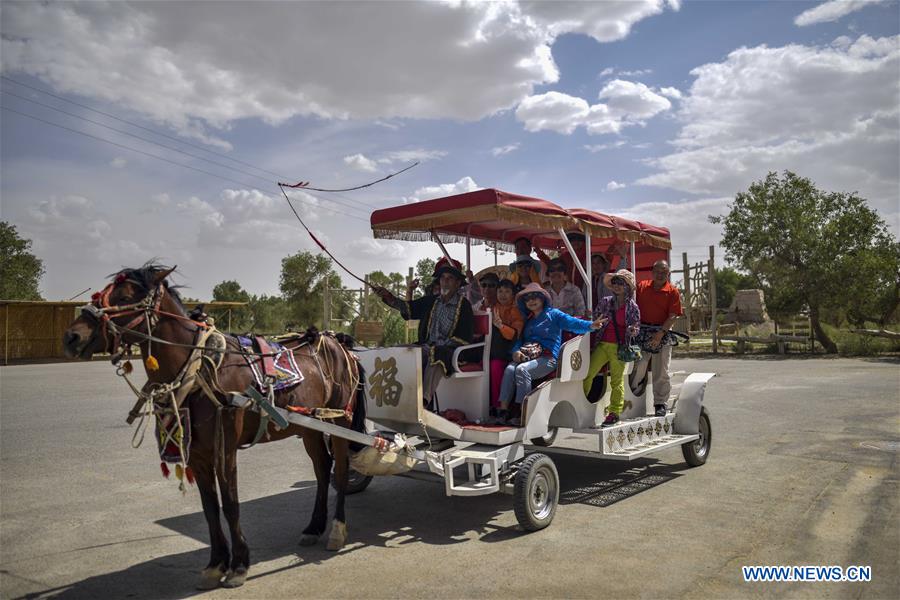
Tourists go sightseeing on a carriage in Lop Nur People Village in Yuli County, northwest China's Xinjiang Uygur Autonomous Region, June 19, 2019. Lop Nur People Village is located in Yuli County, where Tarim River flows through the deserts with populus euphratica forests' reflection on the shimmering waves. Amudun Abudu, a 61-year old typical Lop Nur villager, works in local tourism industry. With the changes of the times, many Lop Nur people have various options for a living, yet he insists on the tradition of fishing in rivers and lakes. Not only does he make delicious roast fish, Amudun also makes canoe models and pen holders made of populus euphratica trees for tourists during the tourist rush season. Like other local villagers, Amudun Abudu's life benefits from the improvement of the environment. Since the initiation of management of Tarim waters, the silted up river bed has been filled with water again. Along the river bank, populus euphratica forests were brought back to life again. Meanwhile, the improvement of infrastructure leads to the increase of visiting tourists. By the end of July, Yuli County has welcomed 780,000 arrivals and received over 110 million yuan (around 15.58 million U.S. dollars) in tourist revenue, up 63.14% and 119.42% on a year-on-year basis. (Xinhua/Zhao Ge)
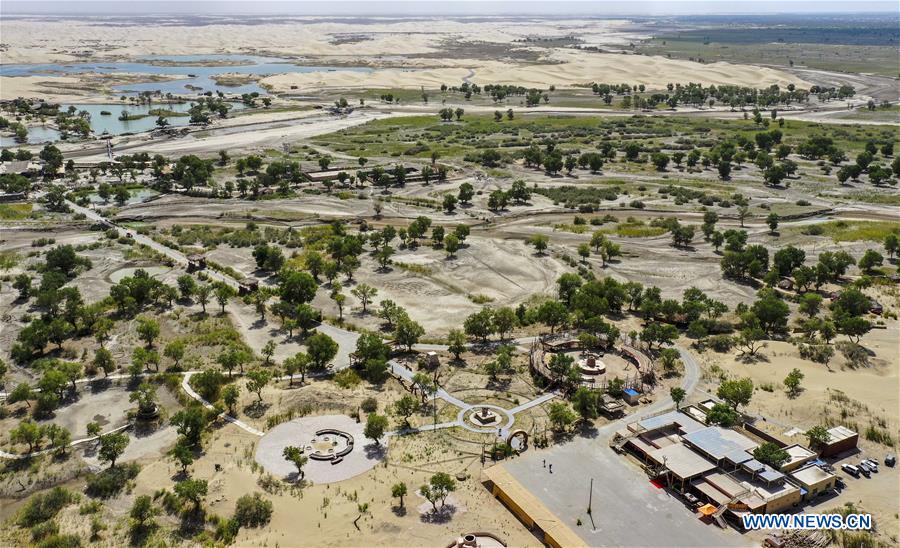
Aerial photo taken on June 19, 2019 shows the part view of Lop Nur People Village in Yuli County, northwest China's Xinjiang Uygur Autonomous Region. Lop Nur People Village is located in Yuli County, where Tarim River flows through the deserts with populus euphratica forests' reflection on the shimmering waves. Amudun Abudu, a 61-year old typical Lop Nur villager, works in local tourism industry. With the changes of the times, many Lop Nur people have various options for a living, yet he insists on the tradition of fishing in rivers and lakes. Not only does he make delicious roast fish, Amudun also makes canoe models and pen holders made of populus euphratica trees for tourists during the tourist rush season. Like other local villagers, Amudun Abudu's life benefits from the improvement of the environment. Since the initiation of management of Tarim waters, the silted up river bed has been filled with water again. Along the river bank, populus euphratica forests were brought back to life again. Meanwhile, the improvement of infrastructure leads to the increase of visiting tourists. By the end of July, Yuli County has welcomed 780,000 arrivals and received over 110 million yuan (around 15.58 million U.S. dollars) in tourist revenue, up 63.14% and 119.42% on a year-on-year basis. (Xinhua/Zhao Ge)

Tourists enjoy leisure time in Lop Nur People Village in Yuli County, northwest China's Xinjiang Uygur Autonomous Region, June 19, 2019. Lop Nur People Village is located in Yuli County, where Tarim River flows through the deserts with populus euphratica forests' reflection on the shimmering waves. Amudun Abudu, a 61-year old typical Lop Nur villager, works in local tourism industry. With the changes of the times, many Lop Nur people have various options for a living, yet he insists on the tradition of fishing in rivers and lakes. Not only does he make delicious roast fish, Amudun also makes canoe models and pen holders made of populus euphratica trees for tourists during the tourist rush season. Like other local villagers, Amudun Abudu's life benefits from the improvement of the environment. Since the initiation of management of Tarim waters, the silted up river bed has been filled with water again. Along the river bank, populus euphratica forests were brought back to life again. Meanwhile, the improvement of infrastructure leads to the increase of visiting tourists. By the end of July, Yuli County has welcomed 780,000 arrivals and received over 110 million yuan (around 15.58 million U.S. dollars) in tourist revenue, up 63.14% and 119.42% on a year-on-year basis. (Xinhua/Zhao Ge)
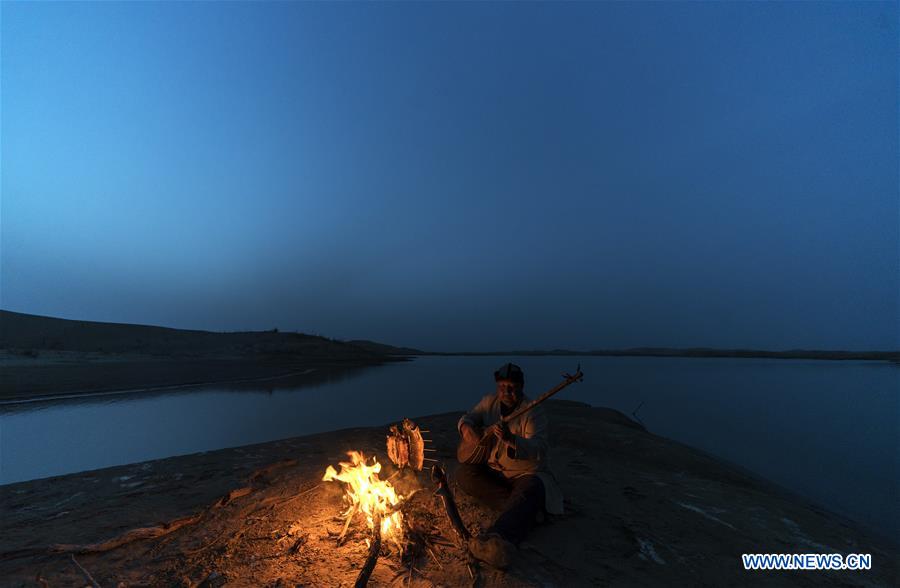
Amudun Abudu plays an instrument in Lop Nur People Village in Yuli County, northwest China's Xinjiang Uygur Autonomous Region, April 11, 2019. Lop Nur People Village is located in Yuli County, where Tarim River flows through the deserts with populus euphratica forests' reflection on the shimmering waves. Amudun Abudu, a 61-year old typical Lop Nur villager, works in local tourism industry. With the changes of the times, many Lop Nur people have various options for a living, yet he insists on the tradition of fishing in rivers and lakes. Not only does he make delicious roast fish, Amudun also makes canoe models and pen holders made of populus euphratica trees for tourists during the tourist rush season. Like other local villagers, Amudun Abudu's life benefits from the improvement of the environment. Since the initiation of management of Tarim waters, the silted up river bed has been filled with water again. Along the river bank, populus euphratica forests were brought back to life again. Meanwhile, the improvement of infrastructure leads to the increase of visiting tourists. By the end of July, Yuli County has welcomed 780,000 arrivals and received over 110 million yuan (around 15.58 million U.S. dollars) in tourist revenue, up 63.14% and 119.42% on a year-on-year basis. (Xinhua/Fei Maohua)
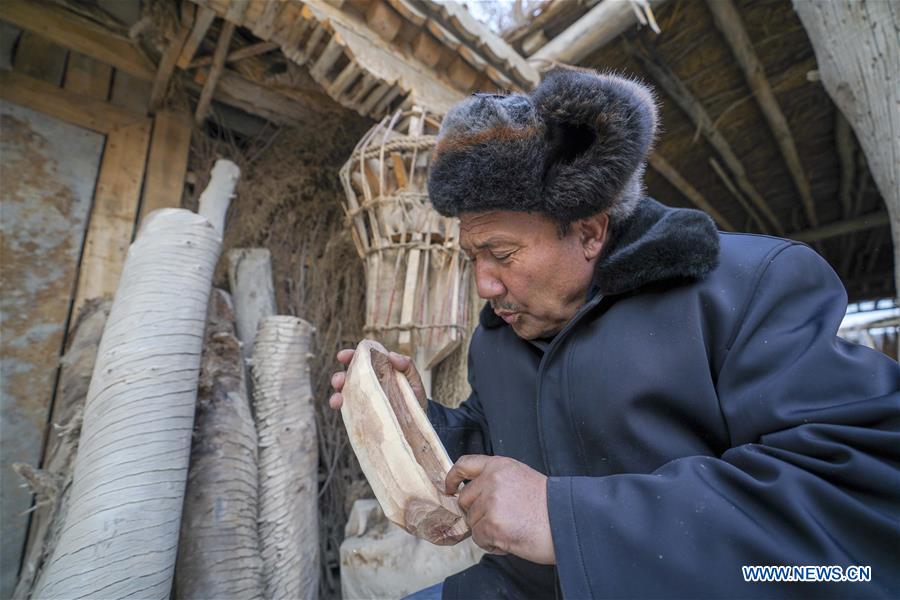
Amudun Abudu makes a canoe model in Lop Nur People Village in Yuli County, northwest China's Xinjiang Uygur Autonomous Region, Jan. 29, 2019. Lop Nur People Village is located in Yuli County, where Tarim River flows through the deserts with populus euphratica forests' reflection on the shimmering waves. Amudun Abudu, a 61-year old typical Lop Nur villager, works in local tourism industry. With the changes of the times, many Lop Nur people have various options for a living, yet he insists on the tradition of fishing in rivers and lakes. Not only does he make delicious roast fish, Amudun also makes canoe models and pen holders made of populus euphratica trees for tourists during the tourist rush season. Like other local villagers, Amudun Abudu's life benefits from the improvement of the environment. Since the initiation of management of Tarim waters, the silted up river bed has been filled with water again. Along the river bank, populus euphratica forests were brought back to life again. Meanwhile, the improvement of infrastructure leads to the increase of visiting tourists. By the end of July, Yuli County has welcomed 780,000 arrivals and received over 110 million yuan (around 15.58 million U.S. dollars) in tourist revenue, up 63.14% and 119.42% on a year-on-year basis. (Xinhua/Zhao Ge)
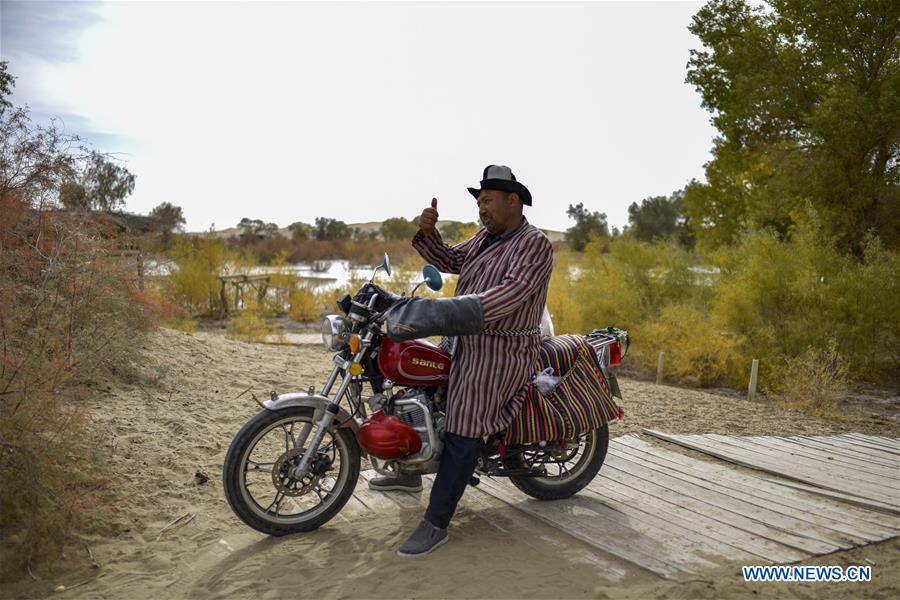
Amudun Abudu greets visitors in Lop Nur People Village in Yuli County, northwest China's Xinjiang Uygur Autonomous Region, Oct. 16, 2018. Lop Nur People Village is located in Yuli County, where Tarim River flows through the deserts with populus euphratica forests' reflection on the shimmering waves. Amudun Abudu, a 61-year old typical Lop Nur villager, works in local tourism industry. With the changes of the times, many Lop Nur people have various options for a living, yet he insists on the tradition of fishing in rivers and lakes. Not only does he make delicious roast fish, Amudun also makes canoe models and pen holders made of populus euphratica trees for tourists during the tourist rush season. Like other local villagers, Amudun Abudu's life benefits from the improvement of the environment. Since the initiation of management of Tarim waters, the silted up river bed has been filled with water again. Along the river bank, populus euphratica forests were brought back to life again. Meanwhile, the improvement of infrastructure leads to the increase of visiting tourists. By the end of July, Yuli County has welcomed 780,000 arrivals and received over 110 million yuan (around 15.58 million U.S. dollars) in tourist revenue, up 63.14% and 119.42% on a year-on-year basis. (Xinhua/Zhao Ge)
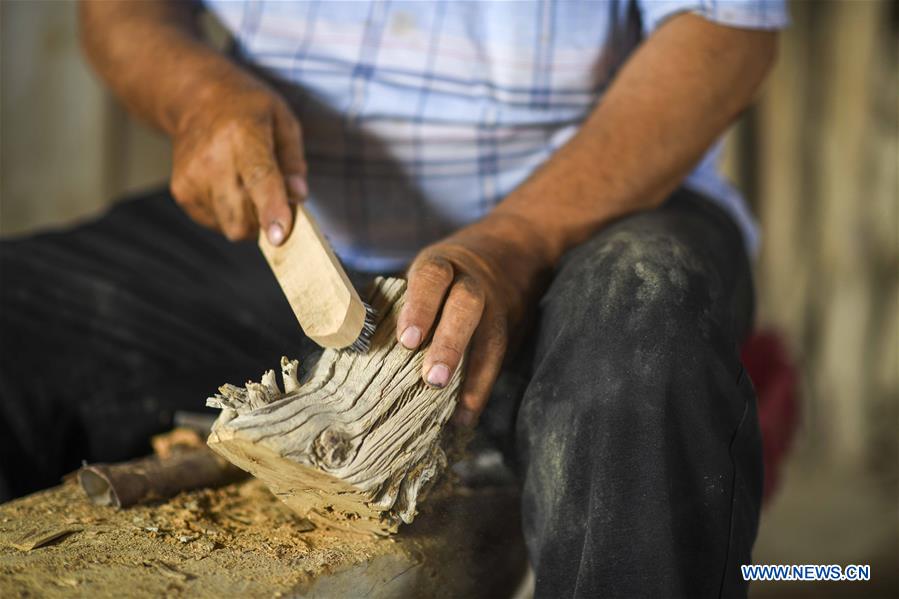
Amudun Abudu makes a pen holder in Lop Nur People Village in Yuli County, northwest China's Xinjiang Uygur Autonomous Region, June 21, 2019. Lop Nur People Village is located in Yuli County, where Tarim River flows through the deserts with populus euphratica forests' reflection on the shimmering waves. Amudun Abudu, a 61-year old typical Lop Nur villager, works in local tourism industry. With the changes of the times, many Lop Nur people have various options for a living, yet he insists on the tradition of fishing in rivers and lakes. Not only does he make delicious roast fish, Amudun also makes canoe models and pen holders made of populus euphratica trees for tourists during the tourist rush season. Like other local villagers, Amudun Abudu's life benefits from the improvement of the environment. Since the initiation of management of Tarim waters, the silted up river bed has been filled with water again. Along the river bank, populus euphratica forests were brought back to life again. Meanwhile, the improvement of infrastructure leads to the increase of visiting tourists. By the end of July, Yuli County has welcomed 780,000 arrivals and received over 110 million yuan (around 15.58 million U.S. dollars) in tourist revenue, up 63.14% and 119.42% on a year-on-year basis. (Xinhua/Zhao Ge)
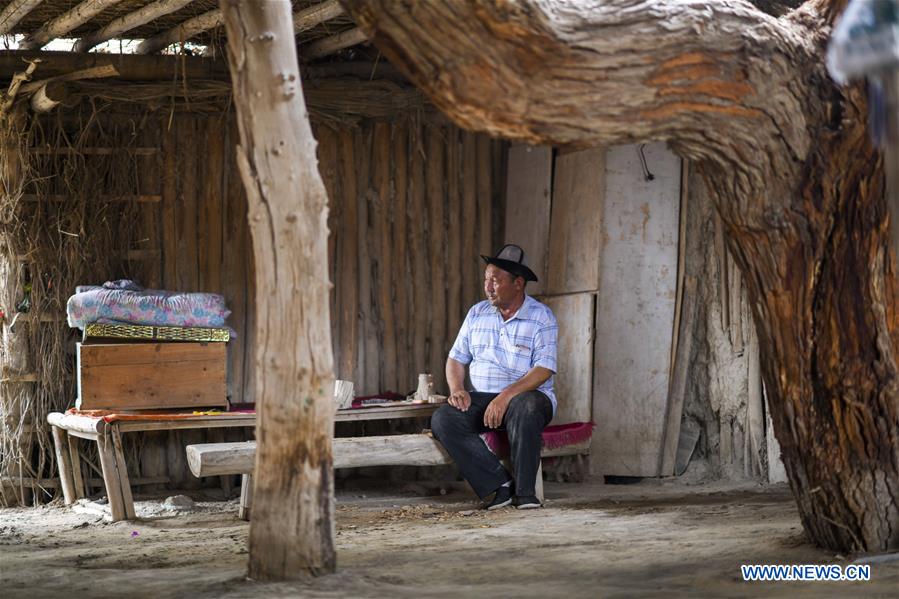
Amudun Abudu rests at home in Lop Nur People Village in Yuli County, northwest China's Xinjiang Uygur Autonomous Region, June 21, 2019. Lop Nur People Village is located in Yuli County, where Tarim River flows through the deserts with populus euphratica forests' reflection on the shimmering waves. Amudun Abudu, a 61-year old typical Lop Nur villager, works in local tourism industry. With the changes of the times, many Lop Nur people have various options for a living, yet he insists on the tradition of fishing in rivers and lakes. Not only does he make delicious roast fish, Amudun also makes canoe models and pen holders made of populus euphratica trees for tourists during the tourist rush season. Like other local villagers, Amudun Abudu's life benefits from the improvement of the environment. Since the initiation of management of Tarim waters, the silted up river bed has been filled with water again. Along the river bank, populus euphratica forests were brought back to life again. Meanwhile, the improvement of infrastructure leads to the increase of visiting tourists. By the end of July, Yuli County has welcomed 780,000 arrivals and received over 110 million yuan (around 15.58 million U.S. dollars) in tourist revenue, up 63.14% and 119.42% on a year-on-year basis. (Xinhua/Zhao Ge)
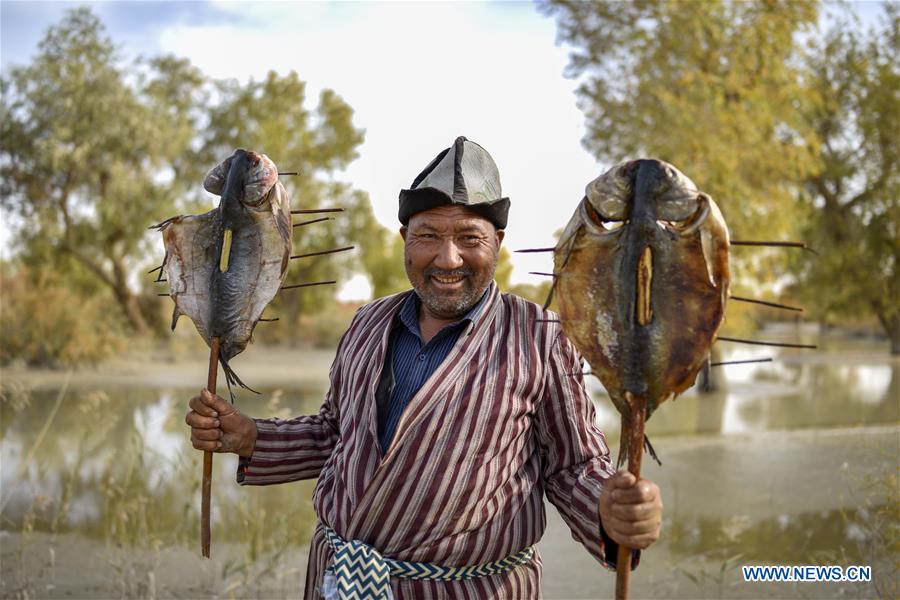
Amudun Abudu demonstrates roasted fish in Lop Nur People Village in Yuli County, northwest China's Xinjiang Uygur Autonomous Region, Oct. 16, 2018. Lop Nur People Village is located in Yuli County, where Tarim River flows through the deserts with populus euphratica forests' reflection on the shimmering waves. Amudun Abudu, a 61-year old typical Lop Nur villager, works in local tourism industry. With the changes of the times, many Lop Nur people have various options for a living, yet he insists on the tradition of fishing in rivers and lakes. Not only does he make delicious roast fish, Amudun also makes canoe models and pen holders made of populus euphratica trees for tourists during the tourist rush season. Like other local villagers, Amudun Abudu's life benefits from the improvement of the environment. Since the initiation of management of Tarim waters, the silted up river bed has been filled with water again. Along the river bank, populus euphratica forests were brought back to life again. Meanwhile, the improvement of infrastructure leads to the increase of visiting tourists. By the end of July, Yuli County has welcomed 780,000 arrivals and received over 110 million yuan (around 15.58 million U.S. dollars) in tourist revenue, up 63.14% and 119.42% on a year-on-year basis. (Xinhua/Zhao Ge)
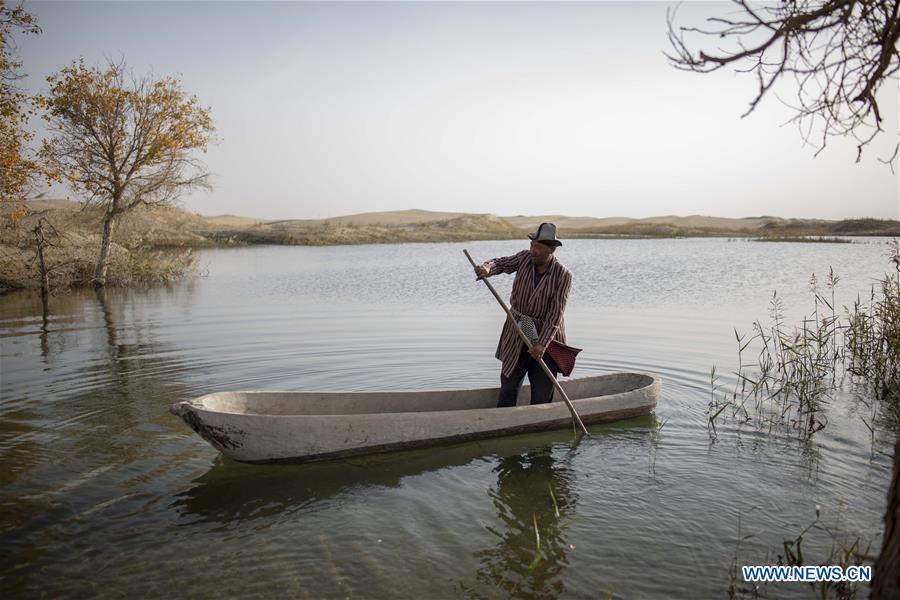
Amudun Abudu rows a canoe for fishing in Lop Nur People Village in Yuli County, northwest China's Xinjiang Uygur Autonomous Region, Oct. 16, 2018. Lop Nur People Village is located in Yuli County, where Tarim River flows through the deserts with populus euphratica forests' reflection on the shimmering waves. Amudun Abudu, a 61-year old typical Lop Nur villager, works in local tourism industry. With the changes of the times, many Lop Nur people have various options for a living, yet he insists on the tradition of fishing in rivers and lakes. Not only does he make delicious roast fish, Amudun also makes canoe models and pen holders made of populus euphratica trees for tourists during the tourist rush season. Like other local villagers, Amudun Abudu's life benefits from the improvement of the environment. Since the initiation of management of Tarim waters, the silted up river bed has been filled with water again. Along the river bank, populus euphratica forests were brought back to life again. Meanwhile, the improvement of infrastructure leads to the increase of visiting tourists. By the end of July, Yuli County has welcomed 780,000 arrivals and received over 110 million yuan (around 15.58 million U.S. dollars) in tourist revenue, up 63.14% and 119.42% on a year-on-year basis. (Xinhua/Zhao Ge)

Amudun Abudu plays an instrument in Lop Nur People Village in Yuli County, northwest China's Xinjiang Uygur Autonomous Region, April 11, 2019. Lop Nur People Village is located in Yuli County, where Tarim River flows through the deserts with populus euphratica forests' reflection on the shimmering waves. Amudun Abudu, a 61-year old typical Lop Nur villager, works in local tourism industry. With the changes of the times, many Lop Nur people have various options for a living, yet he insists on the tradition of fishing in rivers and lakes. Not only does he make delicious roast fish, Amudun also makes canoe models and pen holders made of populus euphratica trees for tourists during the tourist rush season. Like other local villagers, Amudun Abudu's life benefits from the improvement of the environment. Since the initiation of management of Tarim waters, the silted up river bed has been filled with water again. Along the river bank, populus euphratica forests were brought back to life again. Meanwhile, the improvement of infrastructure leads to the increase of visiting tourists. By the end of July, Yuli County has welcomed 780,000 arrivals and received over 110 million yuan (around 15.58 million U.S. dollars) in tourist revenue, up 63.14% and 119.42% on a year-on-year basis. (Xinhua/Zhao Ge)
